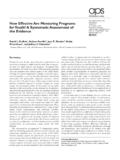Transcription of First Do No Harm: Ethical Principles for Youth Mentoring ...
1 First Do No harm : Ethical Principles for Youth Mentoring RelationshipsJean RhodesUniversity of Massachusetts, BostonBelle LiangBoston CollegeRene e SpencerBoston UniversityMentoring programs pair Youth who are perceived to be at risk for poor outcomes with volunteers whoare trained to provide support. Although Mentoring has experienced tremendous growth in recent years,the Ethical challenges inherent in relationship-based interventions have been given insufficient attentionamong researchers and practitioners. Rarely acknowledged is the potential for harm that poorly imple-mented Mentoring relationships can render. To redress this problem, a set of Ethical Principles forvolunteer mentors is presented. They are derived, in part, from the American Psychological Association s(2002) Ethical Principles of Psychologists and Code of Conductas well as Ethical codes that have beenformulated to guide other paraprofessionals and volunteers in community settings.
2 A description of theseprinciples and their application to Youth Mentoring is :ethics, Ethical Principles , volunteerism, Youth mentoringYouth Mentoring programs ( , Big Brothers Big Sisters)have experienced tremendous growth in the past 2 of young people have a volunteer mentor involved intheir lives, and the numbers are continuing to rise at an unprec-edented rate (MENTOR/National Mentoring Partnership,2006). Volunteer mentors often enter these relationships with astrong desire to make a difference in the lives of young , the Ethical implications of placing unrelatedyouth in the care of adults has been largely ignored in the fieldof Youth Mentoring . There are few guidelines to address theethical responsibilities and obligations of adult mentors, or evena clear consensus as to what they should be. Moreover, althoughvolunteer training can affect efficacy and retention, relationshipquality, and Youth outcomes (DuBois, Holloway, Valentine, &Cooper, 2002; DuBois & Neville, 1997; Karcher, Nakkula, &Harris, 2005), its implementation across programs is lack of attention is particularly alarming, given the sheernumber of mentors entering into matches with Youth and thefact that nearly half of the relationships terminate prematurely(Rhodes, 2002).
3 The goal of this article is to delve into some ofthe moral ambiguities that arise in relationship-based volunteer-ism, to present a set of Ethical Principles , and to initiate adialogue around the responsibilities involved in volunteer men-toring. Particularly because there is no governing body foryouth Mentoring or for volunteer Youth workers more generally,these guidelines are construed less as enforceable standardsthan as a set of ideals informed by current research and prac-tices in the Mentoring strikes deep emotional chords and has at-tracted powerful constituents who, at some level, have looked toresearch to confirm what they intuitively hold to be true. Andbecause most program administrators are working under the tacitassumption that Mentoring programs are universally beneficial toyouth (an assumption that has been countered in the researchliterature; Grossman & Rhodes, 2002; Rhodes & DuBois, 2008),they often dedicate their limited resources into launching newmatches, sometimes at the expense of supporting existing , because volunteer recruitment is often the rate-limitingfactor in program growth, many programs have relaxed minimumvolunteer screening, commitment, and training trends have reduced the burden that is placed on agenciesand volunteers but are at odds with the types of practices that areneeded to establish and sustain high-quality Mentoring relation-ships (DuBois et al.)
4 , 2002; DuBois & Karcher, 2005; Herrera et al.,JEANRHODES received her PhD in clinical/community psychology fromDePaul University. She is professor of psychology at University of Mas-sachusetts, Boston. Her areas of research include Mentoring relationships,preventive interventions, emerging adulthood, and risk and protectivefactors. She is chair of the Research and Policy Council of MENTOR/National Mentoring her PhD in clinical psychology from Michigan StateUniversity. She is associate professor of counseling psychology at in theLynch School of Education at Boston College. Her areas of researchinclude Youth Mentoring and relational health in adolescence and youngadulthood, cultural competence, and trauma recovery and EESPENCER received her EdD in human development psychology fromHarvard University s Graduate School of Education. She is associateprofessor in the School of Social Work at Boston University.
5 Her researchinterests Youth Mentoring , adolescent development, and gender ACKNOWLEDGEthe support of the William T. Grant Foundation andMENTOR/National Mentoring Partnership in preparing this report as wellas the staff, volunteers, and Youth of the Big Sister Association of GreaterBoston program and the Big Brothers Big Sisters of Massachusetts CONCERNING THIS ARTICLE should be addressed to JeanRhodes, Department of Psychology, University of Massachusetts, Boston, 100 Morrissey Boulevard, Boston, MA 02125. E-mail: Psychology: Research and Practice 2009 American Psychological Association2009, Vol. 40, No. 5, 452 4580735-7028/09/$ DOI: ). Funding agencies reinforce this tendency, often using thenumber of new matches, as opposed to their sustainability, as themeasure of program success. The only real danger associated withplacing children in the care of unrelated adults, in the thinking ofmany practitioners and policy makers, is child molestation a verytroubling but comparatively infrequent occurrence (Saul & Aud-age, 2007).
6 The disappointment and suffering of prote ge s whosementors fail them in more subtle ways goes largely children fade quietly from programs, and the troubled rela-tionships they represent are overshadowed by the more compellingsuccess stories of their , because a personal relationship is at the heart of mentoringinterventions, inconsistencies, misunderstandings, and termina-tions can touch on Youth s vulnerabilities in ways that other, lesspersonal, approaches do not. To the extent that prote ge s haveidentified with their mentors, and have begun to value the rela-tionship, they may feel profound disappointment, rejection, andbetrayal when problems arise. Such feelings, in turn, may lead toa host of negative emotional, behavioral, and academic outcomes(Downey, Lebolt, Rincon, & Freitas, 1998). Indeed, in two, largerandom assignment studies, Youth in prematurely terminating men-toring relationships showed increases in problem behaviors rela-tive to a control group (Grossman & Rhodes, 2002; Herrera et al.)
7 ,2007). A recent qualitative study described the disappointmentexperienced by Youth abandoned by their mentors (Spencer, 2007).In the following sections, we present a set of Ethical principlesto guide volunteer mentors and the program staff who advise themas they strive to build meaningful and growth-promoting relation-ships with their prote ge s. These are based, in part, on the AmericanPsychological Association s (APA; 2002) Ethical Principlesof Psychologists and Code of Conductestablished for practicingpsychologists and informed by research findings and there are limits to the clinical analogy, Mentoring andtherapeutic relationships do share certain commonalities. For ex-ample, both types of relationships are situated somewhat outsidethe recipient s network of family, friends, and neighbors, yet aresupported by another kind of infrastructure: the therapist s profes-sional community and the volunteer s Mentoring program.
8 In ad-dition, both Mentoring and therapeutic relationships are character-ized by inherent power differentials and involve scheduled sessions, often on a weekly basis. The most important common-ality, however, is that both relationships involve a human connec-tion whose explicit goal is to foster the positive development ofone of the partners. When positive change comes about in theclient or prote ge , it is often the result of an empathic bond with thetherapist or mentor (Spencer & Rhodes, 2005).The Ethical Principles that serve as the foundation for APA sEthics Code(2002) are thus a helpful reference to consider inestablishing Mentoring ethics. We have drawn on the five generalprinciples (a) beneficence and nonmaleficence, (b) fidelity andresponsibility, (c) integrity, (d) justice, and (e) respect for people srights and dignity and developed a set of corollary Principles foryouth Mentoring relationships.
9 In so doing, we have consulted withethicists in mental health and with administrators and staff informal Mentoring programs, and have considered Ethical guide-lines established for Youth workers in Great Britain and Australia(The National Youth Agency, 2004; Youth Affairs Council West-ern Australia, 2003). Our extension of these Principles is furtherinformed by community research and practice ( , Fawcett, 1991;Heller, 1989; Pettifor, 1998; Serrano-Garcia, 1994) and outcomeresearch on Mentoring programs with a specific eye toward whatconstitutes quality mentor relationships and established guidelines are relevant to the wide range of Youth mentoringrelationships ( , face-to-face, online, and group Mentoring ) and,potentially, to other voluntary adult Youth relationships, such asthose forged through other programs and contexts ( , sportsteams, Youth groups, camp). Ethical Principles for Youth Mentoring RelationshipsBelow we delineate five guiding Principles for Ethical behaviorin Youth Mentoring relationships, defined in more colloquial lan-guage to enhance their accessibility and usability in Youth men-toring practice.
10 The general principle from APA sCode of Ethics(2002) on which each is based is provided in parentheses. Theseprinciples overlap in many respects and are by no means mutuallyexclusive. The examples, which illuminate the application of theprinciples, are drawn from the authors collective experiencesconducting qualitative research on Youth Mentoring relationshipsand interfacing with practitioners in the field and qualitative re-search on Youth Mentoring : Promote the Welfare and Safety of the Young Person(Beneficence and Nonmaleficence)Mentors should work to benefit their prote ge s, or at the veryleast, to do no harm . At face value, this may appear to be the mostobvious and least controversial of all Principles . In Ethical theory,the concept of beneficence, on which this principle is based,encompasses behavior that benefits the good of another and thathelps them to avoid harm (Fisher, Hoagwood, & Jensen, 1996).











